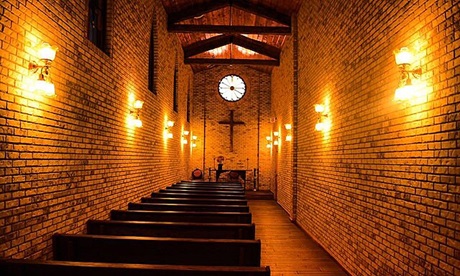Liminal Spaces is the name of a Facebook page I follow.
It does show me interesting images, but also frustrates me somewhat, because lots or even most of the images aren’t liminal at all.
At least, not in the way I’m familiar with.
Liminal explained
The Latin word “limin” means “threshold,” and thus liminality has to do with things that are neither this nor that, or perhaps both this and that, because they are transitional, in-between.
But apparently there is something called “liminal aesthetics,” which just means “eerie” or “otherworldly in an unsettling way.”
In any case, no matter how you’re using the word, liminal places do tend to be eerie or unsettling, and that’s because humans share a desire to know where they are and what is going on.
Liminal Spaces and the chapel
It was especially odd to see a photo of a chapel posted on Liminal Spaces.
It was one I’ve never seen before: The Traveler’s Chapel in Wall Drug, which is a kitschy, tourist-driven little mall in the tiny town of Wall, South Dakota, that began as a drug store, and grew from there.
It has lots of souvenirs, a few restaurants, an 80-foot statue of a brontosaurus, various hot dogs and homemade doughnuts, and free ice water, which is apparently famous.
The more I read about it, the more I think the appropriate word is not “liminal” but “baffling.”
But then there is the chapel.
The chapel (pictured) is extremely simple in design: Just a single, narrow corridor with perhaps 12 pews flush to the wall on the left and an aisle down the right.
The walls seem to be made of earth-toned brick, and the ceiling is slightly vaulted and fashioned of highly polished wooden beams.
A low, raised platform at one end holds a minimalistic wooden altar flanked by two chairs. Most of the light comes from a rose window under the peaked roof. Under that, taking up about half the wall, is an unadorned wooden cross. That’s all.
I suppose it qualifies as a liminal space because, as the person who posted the photo noted, it was “taken at a s***** strip mall in South Dakota,”.
The sheer quiet unexpectedness of something like this in such a setting knocks you back on your heels a bit.
Wall Drug has become a destination in itself; but originally it was conceived of as a way station for travellers headed for famous spots like Mount Rushmore.
Literally an in-between spot, something so unremarkable in itself that offering free ice water to passers-by was considered a brilliant marketing move.
But one of the top commenters said, “I’m an extremely unreligious person but something about this space feels so comforting to me”.
Another responded, “I think it’s because it’s single task. Purpose driven. Nothing can happen here without absolute focus to a specific spot. I like it too.”
Just some throwaway comments made in passing on a Facebook group, I know.
But notice that the second commenter thinks it’s refreshing, and remarkable, to be in a spot with a clear and specific purpose. The very simplicity of the chapel, with its single, narrow aisle and its simple point of focus, is something people want, even if they don’t love the cross.
It is good to know exactly where we are and what we are doing, for once. It’s rare. And it’s something people crave, like a traveler on a baking hot highway in the midwest craves free ice water. One commenter said it looked like a place she could go and cry.
Liminal world
My father used to say that you’d have to forgive his behaviour; that he was going through an awkward stage, the one between birth and death.
He was joking, but also dead serious: The world itself is liminal, in-between, a place of transition, neither this nor that.
That’s a terrible thing to know if you don’t know where you’re headed next, or if you don’t even think there is any particular right way to go.
But if you can stop for a moment, and think of a place that’s “single task,” with “absolute focus to a specific spot,” then this liminal life is not so frightening.
We may be in transition, but we’re not lost. We know where we are going.
There is a single aisle, a single source of light, and a simple cross. And the water is free.
- First published in The Catholic Weekly
- Simcha Fisher is a blogger and the author of The Sinner’s Guide to Natural Family Planning
